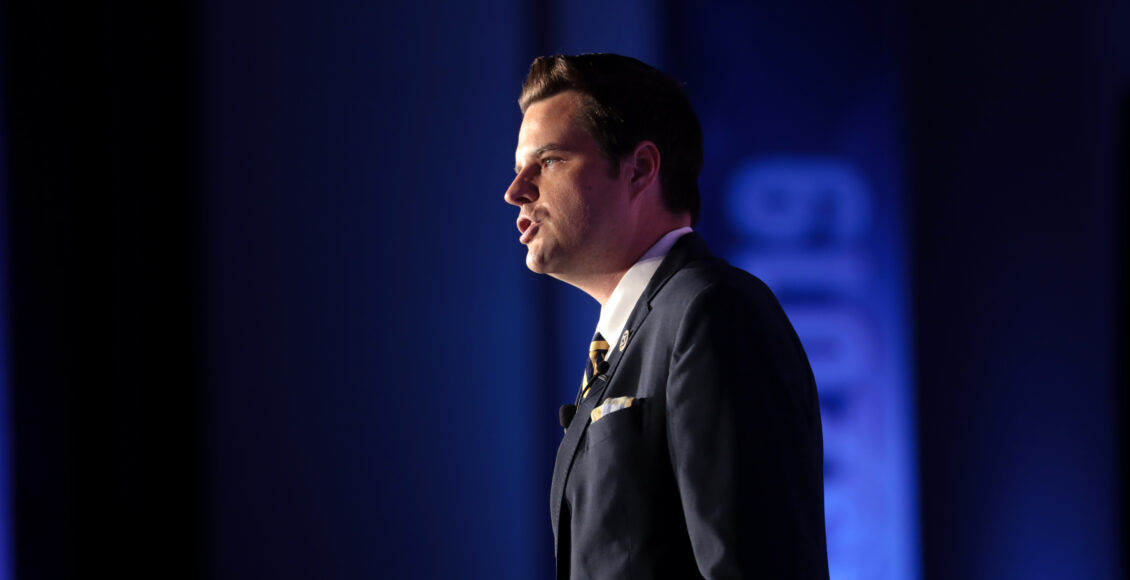Here is the Most Disruptive Member of Congress

For the first time in American history, a Speaker of the House was removed from their position; Rep. Kevin McCarthy was ousted from his role on October 3, 2023. This historical event is the result of the Republican Party’s growing internal divisions and turn to political extremism since Donald Trump’s election in 2016. Nonetheless, most GOP lawmakers supported McCarthy and voted to keep him as Speaker. A group of eight hardline Republicans were responsible for former Speaker McCarthy’s downfall and the political chaos which has ensued. Specifically, Rep. Matt Gaetz emerged as the ringleader of McCarthy’s ousting and affirmed his status as today’s most disruptive member of Congress.
A Skyrocketing Political Career
Gaetz is a hardline conservative within the GOP. He joined the House of Representatives in 2017, at the same time that Trump entered the White House, and used Trump’s overhaul of the Republican Party to build himself a political career. Despite a sex-trafficking scandal and investigation, he managed to secure a fourth term in 2022. Nonetheless, this scandal did not alter his political career as Gaetz’s unwavering allegiance to Trump secured him partisan support. Gaetz ““jumped on the Trump train,” making efforts to build a relationship with the former president as soon as he was elected; Gaetz was aligned with Trump’s position 85% of the time during his presidency.

Gaetz has modelled his political career on Trump’s by backing alternative politics and rejecting the political mainstream, differentiating himself from his peers. These differences became his trademark throughout his time in Congress. For instance, like most hardline isolationist Republicans, he staunchly opposes American aid to Ukraine. However, he has distanced himself from fellow Republicans and Trump by backing pro-marijuana legislation.
An Isolated but Powerful Congressman
Gaetz’s political strategy is based on aggressive declarations and distance from his political allies, which has generated considerable backlash across the American political spectrum. Jimmy Kimmel recently called Gaetz the “least popular guy in Congress” after he contributed to McCarthy’s removal from the speakership. After Gaetz joined Congress, he focused on building a relationship with Trump instead of his party members in the House. As a result, Gaetz has very few political friends in Congress.
Gaetz and a small group of hardline conservatives orchestrated McCarthy’s ousting from the Speaker position. McCarthy struggled to get elected in January as hardline Republicans, led by Gaetz, refused to support his candidacy for the speakership if he did not agree to various conditions. Among the conditions was the agreement that only one vote was needed to launch a motion to vacate, which could remove McCarthy from the speakership. After agreeing to this condition, McCarthy was elected as Speaker on the 15th ballot, the longest speakership vote since 1859. On October 2nd, 2023, Gaetz used this tool against McCarthy in response to McCarthy seeking Democrat support to avoid a government shutdown.

Gaetz’s move to oust McCarthy from his position disrupted Congress but also isolated him. For instance, Republican lawmakers refused to let him sit with them during the motion vote on McCarthy’s speakership, as many saw Gaetz’s decision as an act of political betrayal. Moreover, some of his Republican colleagues threatened to remove him from the conference. Now, Gaetz is widely disliked by his GOP counterparts since his involvement in McCarthy’s removal has bolstered internal divisions within the party and created institutional chaos in Congress.
Gaetz sought political gains when taking the risk to remove McCarthy from the speakership. By doing so, he set himself up as a conspicuous politician; he tried to benefit from this new popularity by sending fundraising emails to his supporters during the vote on McCarthy’s position, which fueled more resentment from GOP lawmakers. Gaetz is “about clicks,” which fosters support from Trump’s constituents but anger from his Republican colleagues.
What Does Matt Gaetz’s Political Ascension Mean for the Republican Party?
Gaetz’s political trajectory epitomizes the GOP’s shift further right in recent years. Once marginalized, hardline conservative lawmakers are now the party’s leading figures. Although Gaetz is not an official member of the Freedom Caucus, his political views align with the group, and he even received support from some of its members when he led the effort to oust McCarthy. Hardline conservatives founded the caucus in 2015 and received tremendous support from Trump after his election. The caucus leads the powerful antigovernment and conservative branch within today’s Republican Party.
Gaetz and the Freedom Caucus have fueled divisions inside the Republican Party, as their positions diverge with the party’s historical platform. McCarthy’s struggle to become Speaker in January shows the disarray the GOP is in today. Further, Gaetz’s political trajectory is an illustration and direct consequence of Trump’s takeover of the party. Policies that used to be marginalized are now at the forefront of the party’s platform. For instance, isolationism and culture wars have become some of the party’s key policies after Trump and Republicans like Gaetz continue to promote these narratives. The Republican Party’s growing divisions and shift to the right raise concerns for the future of the 118th Congress. Now, the party is divided between moderate Republicans, hardline conservatives, and traditional neoconservatives. Steven Scalise, the No. 2 Republican in the House, failed to get enough support from Republican lawmakers to replace McCarthy as Speaker. Therefore, the institutional chaos that is fueled by division could last for weeks. The Republican Party’s failure to secure cohesion and the disruptive actions of individual lawmakers, such as Matt Gaetz, continue to threaten American democracy.
Featured image is licensed under CC BY-SA 2.0
Edited by Joseph Pappas.
